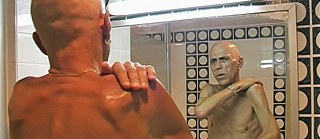2000–2003 | 99 min.
Talk Straight: The World of Rural Queers

By Wieland Speck
Talk Straight: The World of Rural Queers
Director: Jochen Hick | Germany 2000-2003 | 99 minutes | Color
Languages: German with English subtitles
Rental formats: DVD, 35 mm; fall 2019: Blu-ray, DCP
World distributor: Galeria Alaska
In contrast, how was it for gay men in the GDR? “Among Men – Gay in East Germany” by Markus Stein and Ringo Rösener (2012) explores with first-hand witnesses the lively underground and the social rejection that, even in socialism, non-hetero individuals had to overcome before a self-confident life was possible – under legal conditions that, incidentally, were much more liberal than in the West. (Documentary)
A musical is always a good choice. The American production “Hedwig and the Angry Inch” by John Cameron Mitchell (2001) is usually met with storms of enthusiasm when it is shown in Berlin. The author is the son of a then commander of the US army in Berlin. Having grown up there during the punk era, he draws the story of Hansel, who is picked up by an African-American soldier while sunbathing in East Berlin, from his own socialization. In order for the soldier to marry Hansel and take him with him to the West, however, a small gender adjustment is necessary. The East Berlin doctors botch it but it’s good enough for the wedding. What remains of the dream of the Golden West? For many years, the play ran successfully off-Broadway in New York with – as in the film – the author and director in the leading role. It also inspired Berlin for months in a row. (In English)
With his film recommendations (in UPPERCASE) Wieland Speck traces central themes of social development in Germany. The recommendations are accompanied by additional proposals (in "quotes").